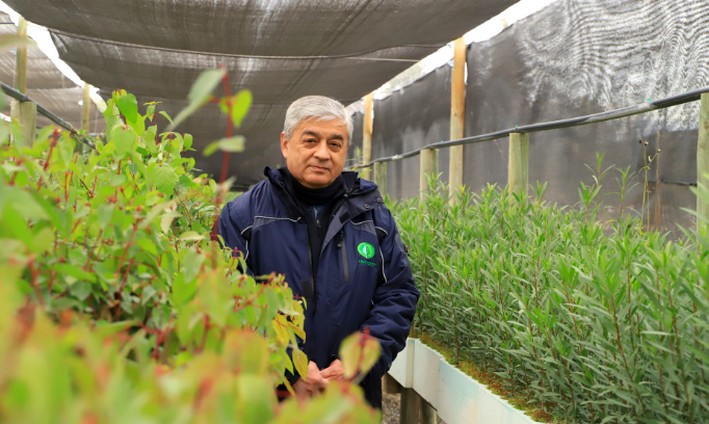- The Mediterranean Ecosystems Research Center conducts seed search and germination in the nursery located at the estate, later reintroducing these specimens into the territory.
The Mediterranean Ecosystems Research Center (CEIEM), established through an agreement between the Division and the Forestry Institute (INFOR), transformed the Hacienda Cauquenes nursery into a site for producing native plants with conservation issues and advancing environmental commitments.
In October 2020, an agreement signed between Codelco’s El Teniente Division and the Forestry Institute (INFOR), an agency under the Ministry of Agriculture, radically shifted the work carried out for three decades at the Hacienda Cauquenes nursery.
From being a breeding site for tree species, it became the Mediterranean Ecosystems Research Center (CEIEM), an institution focused on researching and reproducing forest species with conservation challenges, as well as producing various native species of the sclerophyllous forest.
"Our focus is on applied scientific research to improve current reforestation conditions and address future challenges like water scarcity. The most important thing is that scientific knowledge is reflected in the study being conducted by INFOR to project forest management into the future," explained Iván Quiroz, a Ph.D. in forest sciences and director of the center.
The Mediterranean Ecosystems Research Center (CEIEM) conducts seed search and germination in the nursery located at the estate, later reintroducing these specimens into the territory. This work is dedicated to producing species under conservation categories and others that are hard to find in the market, such as cacti or Adiantum gertrudis, also required by Environmental Qualification Resolutions (RCA).
"We also contribute to solving technical problems. We have a greenhouse where we control environmental variables like temperature, humidity, and radiation, among others, allowing us to produce species such as the Chilean palm and cacti," added Quiroz.
The expert highlighted that the work at Hacienda Cauquenes "has focused on species like naranjillo, lingue, Chilean palm, canelo, ferns, and others under conservation categories. Additionally, some species of cacti and bromeliads are included."
Focus on Sustainability
CEIEM contributes to Codelco’s Corporate Sustainability Policy, aiming to support compliance with environmental regulations and requirements, develop measures for Climate Change, promote carbon neutrality, and innovate through applied research to restore ecosystems affected by heavy metals.
Day by day, the center works to become a Scientific-Technical benchmark, offering solutions for reforestation challenges and El Teniente’s environmental commitments in the diverse territories where the company operates. Additionally, it strives to be a specialized center in Ecosystem Biodiversity, a leader in community environmental education contributing to regional sustainability, and a national reference in restoring and/or rehabilitating areas impacted by mining operations.
CEIEM IN NUMBERS:
• 35 years of the reforestation plan driven by El Teniente
• 350,000 plants produced annually in the nursery
• 20 different species
• 1,310 hectares for reforestation
• 1,634 hectares for replanting
• 1,300,000 plants of various native species to be produced in the next 5 years
• 50,000 plants produced annually for community distribution
Source:ultimahora.cl







Comentarios (0)
No hay comentarios aún. ¡Sé el primero en comentar!
Deja un comentario